Immunohistochemistry Guías de estudio, Notas de estudios & Resúmenes
¿Buscas las mejores guías de estudio, notas de estudio y resúmenes para Immunohistochemistry? En esta página encontrarás 128 documentos de estudio para Immunohistochemistry.
Página 3 fuera de 128 resultados
Ordenador por
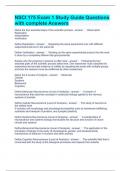
-
NSCI 175 Exam 1 Study Guide Questions with complete Answers
- Examen • 14 páginas • 2023
-
Disponible en paquete
-
- 19,11 €
- + aprende más y mejor
NSCI 175 Exam 1 Study Guide Questions with complete Answers Name the four essential steps of the scientific process Observation Replication Interpretation Verification Define Replication Repeating the same experiment over with different subjects/animals but in the same lab Define Verification Working on the same experimental protocol but the work is done by a completely different lab group/scientist Explain why the progress in science is often slow Following the fou...
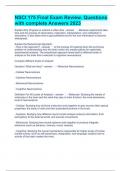
-
NSCI 175 Final Exam Review. Questions with complete Answers 2023
- Examen • 26 páginas • 2023
-
Disponible en paquete
-
- 21,50 €
- + aprende más y mejor
NSCI 175 Final Exam Review. Questions with complete Answers 2023 Explain Why Progress in science is often slow -Because experiments take time and the process of observation, replication, interpretation, and verification is exhaustive. It also takes time to get published and for the new information to become widespread. Explain the Reductionist Approach: - How is the Approach? Is the process of breaking down the enormous problem of understanding how the brain works into smaller pieces ...
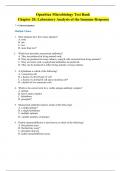
-
OpenStax Microbiology Test Bank Chapter 20: Laboratory Analysis of the Immune Response
- Examen • 13 páginas • 2024
-
Disponible en paquete
-
- 13,39 €
- + aprende más y mejor
OpenStax Microbiology Test Bank Chapter 20: Laboratory Analysis of the Immune Response * = Correct answer Multiple Choice 1. Most antigens have how many epitopes? A. none B. one C. two D. more than two* 2. Which best describes monoclonal antibodies? A. They are produced in living animals only. B. They are produced in tissue cultures, using B cells extracted from living animals.* C. They are rarely used, so polyclonal antibodies are preferred. D. They can be produced in either liv...
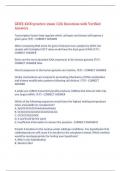
-
GENE 4200 practice exam 1|26 Questions with Verified Answers,100% CORRECT
- Examen • 5 páginas • 2024
-
- 10,03 €
- + aprende más y mejor
GENE 4200 practice exam 1|26 Questions with Verified Answers Transcription factors help regulate which cell types and tissues will express a given gene (T/F) - CORRECT ANSWER When comparing RNA levels for gene X between two samples by qPCR, the sample with thehighest DCT value would have the least gene X RNA (T/F) - CORRECT ANSWER Exons are the most abundant DNA sequences in the human genome (T/F) - CORRECT ANSWER false Most transposons in the human genome are inactive. (T/F) - COR...
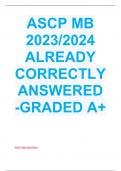
-
ASCP MB 2023/2024 ALREADY CORRECTLY ANSWERED -GRADED A+
- Examen • 23 páginas • 2023
-
Disponible en paquete
-
- 12,42 €
- + aprende más y mejor
ASCP MB 2023/2024 E. coli RNA Polymerase II - Answer DNA template, product: mRNA RNA Polymerase I - Answer DNA template Location: Nucleous Products: 18s, 5.8s, 28s rRNA RNA Polymerase II - Answer DNA template Location: Nucleus Products: mRNA, snRNA RNA Polymerase III - Answer DNA template Location: Nucleus Product: tRNA, 5s rRNA, snRNA Mitochondrial RNA Polymerase - Answer DNA template, product: mRNA Mammalian DNA polymerase α - Answer DNA template, product: primers ...
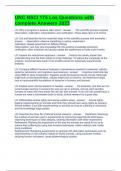
-
UNC NSCI 175 Los Questions with complete Answers 2023
- Examen • 12 páginas • 2023
-
- 20,55 €
- + aprende más y mejor
UNC NSCI 175 Los Questions with complete Answers 2023 LO: Why is progress in science often slow? The scientific process requires observation, replication, interpretation, and verification. These steps take a lot of time. LO: List and describe the four essential steps in the scientific process with examples observation: observe something in nature, experiment replication: repeat experiment on different things interpretation: see how new knowledge fits into existing knowledge structure...
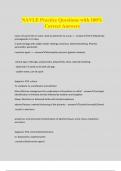
-
NAVLE Practice Questions with 100% Correct Answers
- Examen • 11 páginas • 2024
-
Disponible en paquete
-
- 10,99 €
- + aprende más y mejor
NAVLE Practice Questions with 100% Correct Answers Cystic structure felt on ovary: what to adminster to a cow--> - answerGnrh followed by prostaglandin in 15 days 5 week old pigs with sudden death: lethargy, lameness, labored breathing. Pleuritis, pericarditis, peritonitis: causative agent--> - answerhaemophilus parasuis (glassers disease) -clinical signs: CNS signs, polyserositis, polyarthritis, fever, labored breathing. - observed in 3 week to 16 week old pigs - sudden onset, ca...
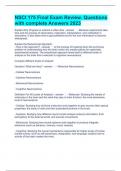
-
NSCI 175 Final Exam Review. Questions with complete Answers 2023
- Examen • 26 páginas • 2023
-
Disponible en paquete
-
- 23,42 €
- + aprende más y mejor
NSCI 175 Final Exam Review. Questions with complete Answers 2023 Explain Why Progress in science is often slow -Because experiments take time and the process of observation, replication, interpretation, and verification is exhaustive. It also takes time to get published and for the new information to become widespread. Explain the Reductionist Approach: - How is the Approach? Is the process of breaking down the enormous problem of understanding how the brain works into smaller pieces ...
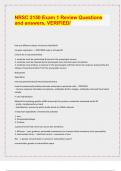
-
NRSC 2150 Exam 1 Review Questions and answers, VERIFIED/| Questions with 100% Correct Answers | Verified | Latest Update.
- Examen • 18 páginas • 2024
-
Disponible en paquete
-
- 9,55 €
- + aprende más y mejor
NRSC 2150 Exam 1 Review Questions and answers, VERIFIED/ how are different classes of neurons identified? via gene expression --> PROTEINS make a cell specific Criteria for a neurotransmitter 1. molecule must be synthesized & stored in the presynaptic neuron 2. molecule must be released by the presynaptic axon terminal upon stimulation 3. molecule must produce a response in the postsynaptic cell that mimics the response produced by the release of neurotransmitter from the presynapti...
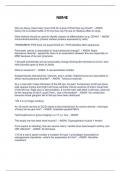
-
NBME Question and Answers with Approved solutions
- Examen • 14 páginas • 2024
-
- 10,51 €
- + aprende más y mejor
NBME Why an deoxy. blood carry more CO2 for a given PCO2 than oxy blood? - ANSW Deoxy Hb is a better buffer of H ions than oxy Hb due to Haldane effect in lungs What method should be used to identify clusters of differentiation (e.g. CD44)? - ANSW Immunohistochemistry (checks surface proteins expressed by cells) *REMEMBER: PCR does not equal ELISA lol - PCR identifies DNA sequences Pancreatic cancer is associated w/ what behavioral change? - ANSW Major depressive disorder - app...

¿Cuánto te has gastado ya en Stuvia? Imagina que sois muchos más los que estáis ahí fuera pagando por apuntes de estudio, pero esta vez TÚ eres el vendedor. ¡Ka-ching! Descubre todo sobre cómo ganar en Stuvia


